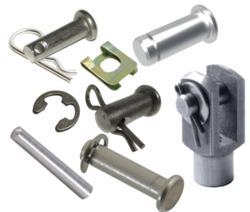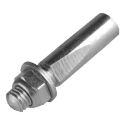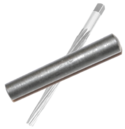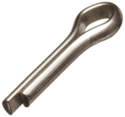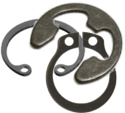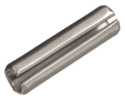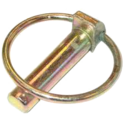Pins and Clips: Difference between revisions
From DT Online
mNo edit summary |
mNo edit summary |
||
| Line 17: | Line 17: | ||
|- | |- | ||
| [https://en.wikipedia.org/wiki/Clevis_fastener '''Clevis Pin'''] | | [https://en.wikipedia.org/wiki/Clevis_fastener '''Clevis Pin'''] | ||
| A [https://en.wikipedia.org/wiki/Clevis_fastener '''Clevis''' ''(aka Yoke)''] has many applications where control rods or rigging wires for example have to be connected. The '''Clevis Pin''' can be threaded or held in place with a '''Split Pin''' and '''[[Nuts and | | A [https://en.wikipedia.org/wiki/Clevis_fastener '''Clevis''' ''(aka Yoke)''] has many applications where control rods or rigging wires for example have to be connected. The '''Clevis Pin''' can be threaded or held in place with a '''Split Pin''' and '''[[Nuts, Bolts and Washers|Washer]]''' or a '''Circlip''' and more specialised clips are also used. | ||
| [[File:ClevisPinsClips.png|125px|right]] | | [[File:ClevisPinsClips.png|125px|right]] | ||
|- | |- | ||
| Line 25: | Line 25: | ||
|- | |- | ||
| [https://en.wikipedia.org/wiki/Split_pin '''Split Pin'''] | | [https://en.wikipedia.org/wiki/Split_pin '''Split Pin'''] | ||
| These are combined with a '''[[Nuts and Bolts|Washer]]''' in everyday use to prevent wheels falling off axles for example. They are used also in conjunction with '''[[Nuts and | | These are combined with a '''[[Nuts and Bolts|Washer]]''' in everyday use to prevent wheels falling off axles for example. They are used also in conjunction with '''[[Nuts, Bolts and Washers|Slot Nuts]]''' or '''[[Nuts, Bolts and Washers|Castellated Nuts]]''' to stop them loosening. | ||
| [[File:SplitPin.png|125px|right]] | | [[File:SplitPin.png|125px|right]] | ||
|- | |- | ||
Revision as of 10:47, 9 October 2015
Both tapered, split and parallel pins are available to join mechanical components together. Sometimes they are used together with a clip of some form to keep them in place.
Many are used to locate components on to shafts and axles either to allow them to turn freely or to rotate with the shaft. Others are used to lock nuts in place and some are used to join couplings together or secure latches.
| Cotter Pin | Most commonly found holding bicycle Pedal Crank Arms on to the Bottom Bracket. | |
| Clevis Pin | A Clevis (aka Yoke) has many applications where control rods or rigging wires for example have to be connected. The Clevis Pin can be threaded or held in place with a Split Pin and Washer or a Circlip and more specialised clips are also used. | |
| Taper Pin | Typical uses of these pins are for holding components on to shafts and axles. They are only slightly tapered to enable them to grip tightly and the receiving hole is prepared by use of a Tapered Reamer. | |
| Split Pin | These are combined with a Washer in everyday use to prevent wheels falling off axles for example. They are used also in conjunction with Slot Nuts or Castellated Nuts to stop them loosening. | |
| 'R' Clip | Also known variously as a Hitch Pin or Hairpin Cotter these can be used in similar situations to a Split Pin but they are easier and quicker to apply. | |
| Circlip | Versions of these clips are either 'sprung' into a groove around the outside of a shaft or a groove around the inside of a hole. Their application or removal is most easily achieved using specialised Circlip Pliers. | |
| Roll Pin | Also known as Spring Pins, these are a tube made of Spring Steel split along its length. They are designed to be a slightly larger diameter than the hole they fit such that, when inserted, they hold themselves in position. | |
| Linch Pin | The Spring Steel ring on these pins is designed such that it snaps over and stays in position to ensure these are self-locking pins. Although most commonly used in tractor and trailer applications or similar, they have many other uses because they are self-contained, easy to insert or withdraw and provide a very positive locking device when used over the end of an axle. |
